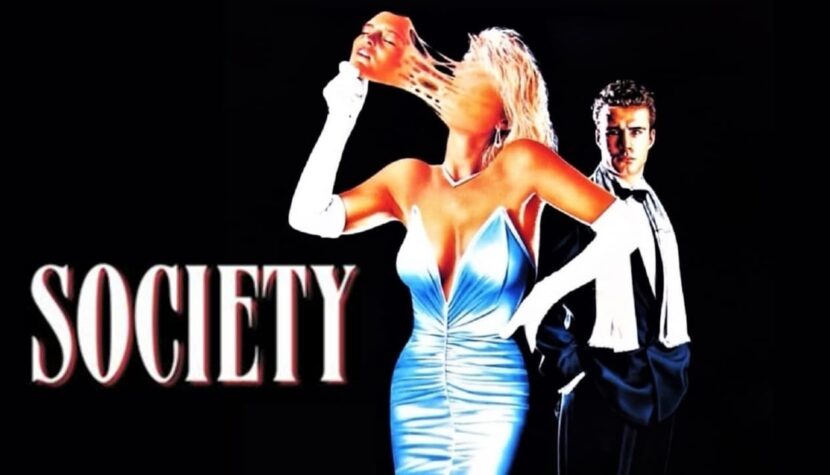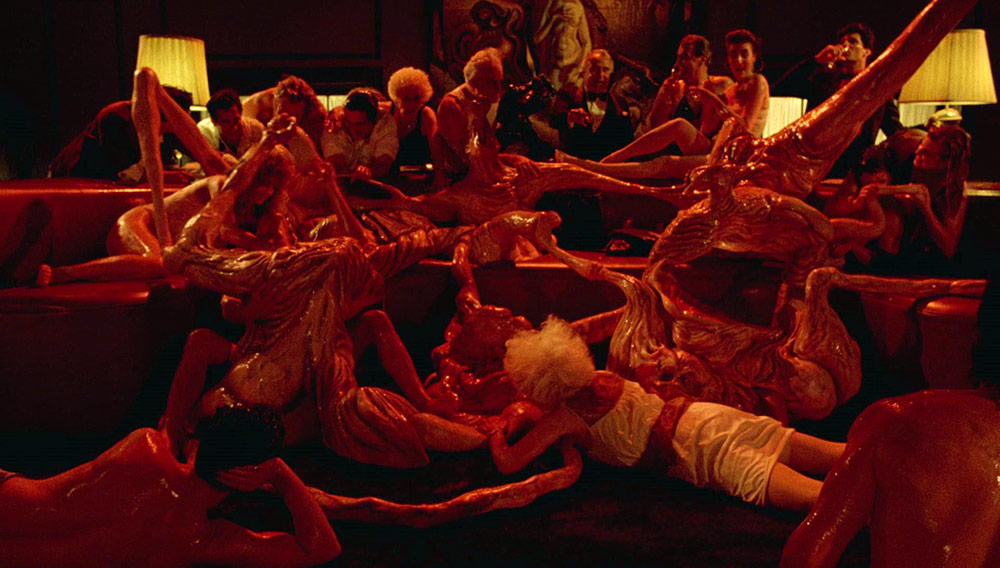SOCIETY. Socially relevant and genuinely shocking

…, especially when that literalness extends beyond the bounds of realism. It is hard to imagine, for instance, Hellraiser or Night of the Living Dead being about the same thing without showing the bloody deeds of the characters and treating phantasmagorical images as an essential part of the creators’ message. Sometimes, you have to go to extremes to extract the meaning of a particular story, even at the cost of good taste. Brian Yuzna’s Society is precisely such a film.
From the very first scenes of Society, we sense that something is amiss with the world in which the high school student Billy lives. He himself suspects this, even though he should have no reason to complain. He comes from a wealthy family in Beverly Hills, excels in his studies, participates in school debates (with success), his girlfriend is a cheerleader, and so on. Nevertheless, he confides in his therapist that he feels alien at home and suspects his family of perverse behaviors, including incest. The glances that the father sends to his daughter and Billy’s sister, the strange distance that the parents maintain towards him, the fact that the boy is a brunette while the rest of the family has fair hair. The teenager is treated as someone inferior, even by some of his peers, which seems absurd because they all belong to the same caste. What lies behind Billy’s suspicions? How to understand the doctor’s words about the boy’s contribution to society?

The surname Yuzna should not be unfamiliar to horror fans. He became famous as a producer of Stuart Gordon’s films (Re-Animator, Dagon), gave Christophe Gans, the later director of Brotherhood of the Wolf and Silent Hill, his start, and was even one of the co-creators of Honey, I Shrunk the Kids. At the end of the 1980s, he decided to try his hand at directing himself, debuting with Society, but also signing both Re-Animator sequels, the macabre romance of Bride of Re-Animator, and the sadistic The Dentist. These films, imbued with a hefty dose of black humor and eerie gore effects, are by no means outstanding representatives of the genre. However, they provide the pleasure of interacting with unabashedly B-movie cinema, which draws its greatest strength from showing things we couldn’t see anywhere else. Physicality, in particular, is the object of Yuzna’s interest, focused on pushing the boundaries associated with resilience, plasticity, and the inadequacy of the human body.

His Society takes aim at the wealthy and privileged, who live in large mansions, seem eternally young, and can do practically anything thanks to their status. What is the secret of their success and fortune? The director seems to suggest it’s certainly repugnant, just like they are. The film’s satirical streak allows us to laugh from the skewed perspective of the main character, who increasingly sees the abnormality and immorality of this world.
In one of the early scenes, he witnesses his sister taking a shower. Through frosted glass shower doors, it’s hard to see anything, but the girl’s body appears unnatural, as if her butt and breasts were located on the same side. Later, Billy hears a recording in which his family discusses the terms of their shared sexual activity. However, the sounds they make during intercourse suggest another, even monstrous kind of activity. Both of these situations are quickly revised – when the shower doors are opened, the sister’s body turns out to be completely normal, and when the hero re-listens to the recording of the terrifying sounds at the therapist’s, it sounds completely different than before. Nevertheless, we believe Billy, mainly because Yuzna is not one for subtlety. He is not interested in creating tension resulting from the possibility that it’s all a product of the protagonist’s wild imagination or that he might be wrong. However, the suggestion that his paranoia is caused by a moment of sexual awakening would make sense if it weren’t for the fact that the actor playing the main role, Billy Warlock (whom you might admire in the early seasons of Baywatch), who was nearing his thirties at the time, not only doesn’t look but also doesn’t come across as an inexperienced teenager.

Yuzna, making his debut, masterfully handles the convention right from the opening credits, where we see bodies in slow motion, entwined in what might seem like the throes of love, an orgy. But this image also shocks with an artificiality – there’s something in their skin, in their movements that is inhuman. This is illustrated by a rendition of the Eton school song, resembling an unsettling hymn in honor of the Society. It’s a pity that later on, it doesn’t go without stumbles, especially in terms of the plot. The subplot of the woman who eats her hair and spits out clumps is entirely unnecessary, pushing the film into the realm of a silly and incomprehensible joke that has nothing to do with the rest of the story. The attempt to discredit Bill in front of the school is meant to turn him into a bundle of nerves and undermine his credibility, but in truth, it doesn’t add anything we haven’t already seen. The relationship with Clarissa (Devin DeVasquez, Miss June 1985), the object of the protagonist’s affections who knows more than she lets on, would be more interesting if we knew why the girl is suddenly loyal to him. Despite these flaws, as well as the very pastel style of the 1980s, the director confidently heads toward a climax that compensates for all previous shortcomings.

In the initial version of the script by Rick Fry and Woody Keith, the mystery of the titular society revolved around a blood cult, but Yuzna preferred something more fantastical, departing from realism in favor of a truly horrifying resolution. What we ultimately see on the screen is extreme and genuinely shocking, not devoid of humor, but still repellent. Most importantly, it brilliantly encapsulates the film’s theme, which revolves around the exploitation of the lower classes by the upper ones, preying on the weaker and poorer, grotesquely flaunting their status, and the fear of the body. All of this takes the form of a surreal nightmare, a terrible parody of reality in which even incest seems like innocent play. Anyone who sees Society, especially its ending, will never forget it.

